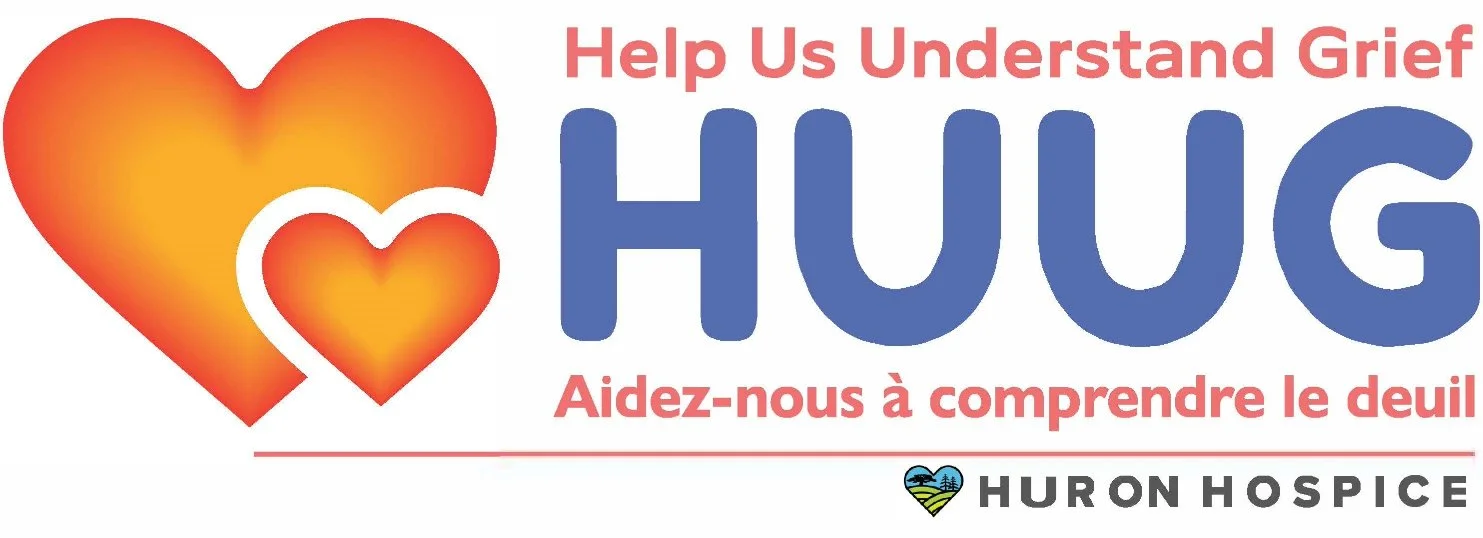Loss & Grief Support Groups
For more information on these programs, please contact:
Sally Brodie, Coordinator of Loss, Grief and Bereavement Programs,
call 519-525-6331 or email: sally.brodie@huronhospice.ca
Loss and Grief support
Grief is the normal and natural reaction to loss, and 100% of us will experience several different types of grief in our lifetime. Grief does not necessarily “wait” to happen until after a death. It can broadside us when we get a depressing diagnosis or anticipate the death of a loved one. It could also result from a lost job, divorce, financial crisis or the breakdown of a relationship. It may happen soon after a loss, or it could be triggered months or years later.
When is the best time to seek support from a Huron Hospice Volunteer? When you feel like you are carrying a heavy burden on your shoulders. Anytime is the right time. We are here to listen and support you.
Huron Hospice’ trained staff and volunteers are skilled listeners, attuned to the needs of those we serve. We offer eight-week grief and bereavement recovery sessions throughout the year. Other programs we offer include Helping Children with Loss, a group for adults to support grieving children and Grief Recovery for Pet Loss. We also offer suicide support sessions.
Would you like more information? Would you like to request some support?
We’re here to help
The Grief Recovery Method
8 WEEKS THAT WILL CHANGE YOUR LIFE
An Action Program for moving beyond death, divorce, and other LOSSES.
Myths about Grief:
“Time heals all wounds”
“Replace the loss”
“Grieve alone”
“Be strong for others”
“Bury your feelings”
Whether your loss is the result of death, divorce, loss of job, or childhood issues (recent or in the past),
RECOVERY IS possible.
Our 8-week Grief Recovery Method program is designed to help you complete the pain, isolation and loneliness caused by loss of any kind. Our certified Grief Recovery Specialists will help to equip you with the tools to resolve the emotions that are causing you pain. This confidential group gives you an opportunity to share and connect with others who have also experienced a significant loss without analysis, judgment, criticism or fixing yourself or others. Sometimes we are the hardest on ourselves.
Grief is normal. We have been socialized to believe that these feelings are abnormal and unnatural. You have a broken heart, not a broken brain. People say you have to “let go and move on in your life.”
Join us to find out how.
This is not a drop-in style group format.Your weekly attendance at the course is vital for maximum benefit in the healing process
Suicide Support Group
(Support for those affected by suicide)
This program is designed to help the healing process for anyone who has lost a loved one to suicide. The death by suicide may be recent or many years ago. It may be the loss of someone very close to you or a more distant acquaintance. In the program participants will share ideas and strategies on how to cope, learn how grief, due to suicide, is unique and discuss and dispel myths and stigma associated with suicide. The program aims to help participants reengage in life in a meaningful and less painful way.
This is not a drop-in style group format. Your weekly attendance at the course is vital for maximum benefit in the healing process.
The Help Us Understand Grief (HUUG) Program provides short term supports and education to children, youth, and families living with serious illness, dying, death, and grief. As with all our services offered at Huron Hospice, HUUG is available to families at no cost. For more information on upcoming HUUG events, please contact Sally Brodie, Coordinator of Loss, Grief and Bereavement at 519-525-6331 or sally.brodie@huronhospice.ca.
Many adults feel apprehensive or unprepared to speak to young people about illness, dying, and death, often due to a desire to protect them from the pain of grief. However, children have expressed their desire to be informed about a family member’s diagnosis, treatment, prognosis, end-of-life care, and death. Many children and youth wish to be told the truth as fully and as soon as possible, to be included in rituals following a death, and to be recognized as grievers alongside adults.
Communicating with children about dying, death, and grief can be very challenging, but having honest, early, and open communication can benefit a child by:
· Making illness, death, and grief a safe, rather than taboo, subject
· Reducing the likelihood of hearing the news accidentally or from people less informed.
· Lessening the likelihood of imagining scenarios that leave them more anxious and fearful.
· Inviting children to ask questions and be open with people they trust.
· Helping children understand the physical or emotional changes they may be seeing.
· Inviting them to think about how they would like to be involved with the person who is ill or dying.
· Giving children the chance to say goodbye in a way that is right for them
For more information on the benefits of facilitating early and honest conversations with grieving children, please visit: www.kidsgrief.ca
For more information on these programs
please contact: Sally Brodie, Coordinator of Loss, Grief and Bereavement Programs
call 519-525-6331 or email: sally.brodie@huronhospice.ca


